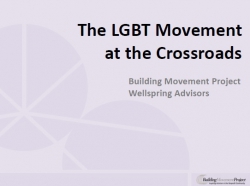Jul
30
2013

Written by Caitlin Endyke
Last Tuesday BMP hosted a webinar based on the findings of our recent report, At the Crossroads: The Future of the LGBT Movement. Following the court strike-down of DOMA and Prop 8 late last month, we found the findings of our report- that movement leaders think marriage equality is but one step towards full inclusion for the LGBT community- were especially relevant. We had over 60 people on the line last week, mostly from advocacy and organizing groups (both LGBT-based and non-LGBT), but with strong representation from grantmakers, consultants, and service delivery organizations as well.
Rebecca Fox kicked off the event by introducing our other presenters and outlining the agenda for the call. Then we heard from the report’s authors Gigi Barsoum, Barbara Masters, and Frances Kunreuther, who outlined the findings and their recommendations for the movement going forward. They suggest that organizations should expand their visions to concentrate on alliance-building with non-LGBT groups, enchance advocacy efforts, and help build capacity in “fly-over” states. When polled, folks on the call echoed these thoughts; participants answered “partnering with other movements” as the top factor that would help to accelerate the LGBT movement.
Later, movement leader Urvashi Vaid spoke about her own experiences in the movement and brought up this question of focus: should we continue to concentrate on legal equality, or should we change our vision to advance lived equality for all LGBT people? Urvashi advocates for the latter, presenting the U.S. South as a case study for illustrating an epicenter of equality issues- from same-sex marriage bans, to prohibitive abortion laws, to voter disenfranchisement. She argued that perhaps the only way to move these issues forward would be to build a united progressive movement in the South, where national groups invested in capacity-building for local organizations, LGBT groups broadened their vision to focus on immigrant rights, and organizations prioritized alliance-building across the board.
Overall, it was an interesting call that generated a lot of conversation across social media and offline. Check out our hashtag #LGBTCrossroads to follow along as we continue to discuss these issues.
You can see a recording of the presentation over on our Youtube page. For a detailed outline of what was covered, you can download the slides used on the call.
For more updates on this project and our other work, don’t forget to sign up for our newsletter, using the Get Our Newsletter button on the top right corner of this page!
